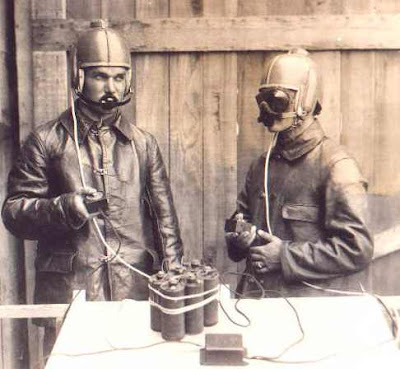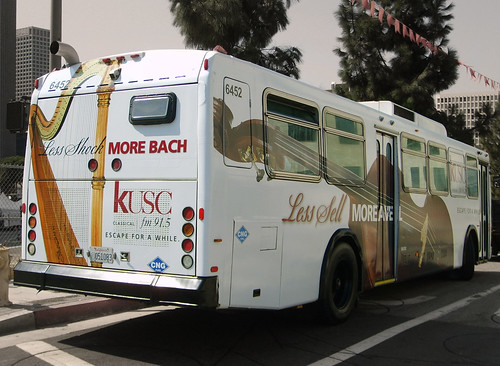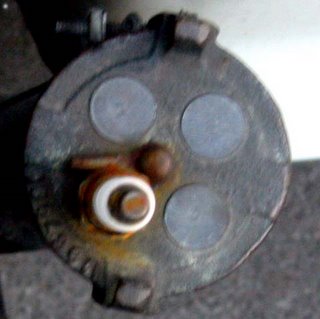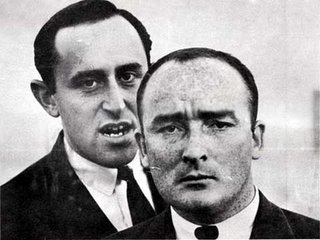I have
two confessions. One -- I used to play the bass clarinet. Two -- I occasionally ego surf (er, I search the web for my own name.)
My mind was completely blown last year when I surfed upon
this July 2006 article by music critic Mark Saleski, someone I had never heard of.
Obviously Mark is a very good critic. He opens his review of an album by bass clarinetist Bennie Maupin (another person with whom I'm not familiar) talking about me. There are several positive paragraphs reminiscing about an otherwise completely forgotten solo bass clarinet composition of mine. He lamented misplacing his recording of it. Saleski writes:
"My cassette recording of that performance has a lot of miles on it—the bass clarinet (so full of character!) being put through those winding passages was something that just made my ears light up."

This particular piece (I'll tell you the title in a minute) was written for
a recital I gave in 1985 at New Music America. It may be hard to believe now, but for more than a decade mostly in the 80s there was a major festival of composers and performers of contemporary music, established and wannabes alike. It was held in a different US city every year. It was actually a big deal.
In 1985 NMA happened in Los Angeles, actively supported by the city's Cultural Affairs Department. LA had had a vast international arts festival the year before, in the shadow of the Olympic Games, and festivals became all the vogue for a while.
My NMA recital was one of four held at the
Arnold Schoenberg Institute (then located at USC in a building I think is designed to look like a piano). The other three new musicians were David Burge, piano, Bert Turetzky, bass, and William Winant, percussion.
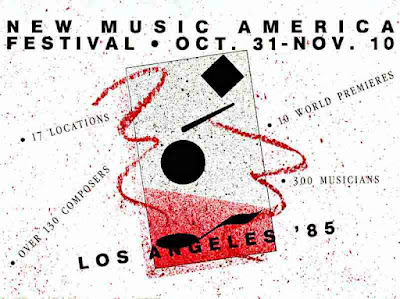 Recorded excerpts from these concerts (and other NMA LA events) were made available to a national public radio network.
Recorded excerpts from these concerts (and other NMA LA events) were made available to a national public radio network. I seem to remember that the number of stations which actually broadcast these programs was firmly in the single digits. But obviously Mark Saleski listened to one of them. More than 20 years later his comments mark the first time I was aware of anyone who had actually listened.
If you do a web search for "New Music America" you'll find that it lives on mostly as entries in the biographies of countless composers and performers - myself included. I found only
this one small Wikipedia entry describing the whole endeavor.
Anyway, after reading Mark Saleski's review, I resolved to provide him with a replacement recording. And also, naturally, to blog about the whole thing for my two regular readers.
I've uploaded three audio excerpts from that recital, all are of me playing bass clarinet.

The piece Mark Saleski wrote about is titled
"The Allegro Fourth Movement from the Symphony Number 3 in F Opus 90 by Johannes Brahms by David Ocker." (yes, I put my own name right at the end of the title.) Fully describing the history and the process and the point of the piece would triple the length of this post - so I'll just say that I made a lead sheet of a Brahms symphonic movement and then changed the notes so I could claim it as my own.
click here to hear The Allegro Fourth Movement from the Symphony Number 3 in F Opus 90 by Johannes Brahms by David Ocker
Copyright (c) (p) 1985 and 2007 by David Ocker - 8 minutes 51 seconds
I opened the recital with a solo improvisation. Although I often improvised in public back then (as part of a trio with
Vinny Golia and
Anne La Berge) it was rare for me to improvise alone. This piece, my only named, marginally repeatable improv, is entitled
"At Sixes and Sevens". The title refers to a rhythmic element that's difficult to hear. Mostly it was an opportunity to show off some of the strange bass clarinet noises I could make.
click here to hear At Sixes and Sevens
Copyright (c) (p) 1985 and 2007 by David Ocker - 4 minutes 22 seconds
I played an encore which was Non-new and Non-American:
my arrangement for solo bass clarinet of the Dance of the Sugar Plum Fairies from Tchaikovsky's Nutcracker. Surreal, huh? I suppose I imagined back then that I could do just about anything on the bass clarinet. Even imitate a celesta.
click here to hear Dance of the Sugar Plum Fairies by Pyotr Ilyich Tchaikovsky, arranged and performed by David Ocker, bass clarinet
Copyright (c) (p) 1985 and 2007 by David Ocker - 2 minutes 26 seconds

This Sugar Plum Fairy picture came from
here. The two shots of me with my bass clarinet are from the 80s, taken by John Livzey in Frank Zappa's UMRK studio. If you look at my beard carefully you can see my very first gray hairs. I've always particularly liked the picture with the clarinet pushing my nose out of joint.
I'm including the full program, the blurb text (also in the picture) and Mark Swed's complete LA Herald Examiner review. In a prior review
Mark Swed had referred to me as a "super-clarinetist" and I, of course, used that term in my promotional materials as often as I could.
Obviously Mark is a very good music critic. In this particular review he tries to define more precisely exactly what he meant by "super-clarinetist."

In 1985 Mark Swed and I didn't yet know that we were distant cousins by marriage. And I most certainly did not know that in 1992 I would marry Leslie Harris, Mark Swed's first cousin once removed. It's entirely possible that I'm related to Mark Saleski somehow as well. I just don't know quite how yet.
THE PROMOTIONAL BLURB
In Recital:
DAVID OCKER
Benny Goodman Never Sounded Like This! The composer/clarinetist performs music by Dolphy, Jarvinen, Martino, Ocker, Smith, Steinmetz, and Tenney.
"Super clarinetist" - Mark Swed, L.A. Herald Examiner
Sponsored by the ICA.
Arnold Schoenberg Institute, USC Campus Tickets: $5 advance, $7 after 10/15 and at the door ($4 students with ID, seniors and ICA members). For tickets after 10/15 call (213) 741-7111.
Info call: (213) 743-5362
THE PROGRAM
David Ocker At Sixes and Sevens solo bass clarinet [listen]
Arthur Jarvinen Carbon solo bass clarinet [listen]
Donald Martino B,a,b,b,it,t clarinet with extensions [listen]
James Tenney Monody solo clarinet
William O. Smith Variants solo clarinet
Eric Dolphy, transcribed Ocker God Bless the Child solo bass clarinet [listen]
John Steinmetz DATACOMP Atari 800 computer and bass clarinet
David Ocker The Allegro Fourth Movement from Symphony Number 3 in F opus 90 by Johannes Brahms by David Ocker solo bass clarinet [listen]
Pyotr Illich Tchaikovsky arr. Ocker Dance of the Sugar Plum Fairies solo bass clarinet [listen]
Sheet music to
Carbon and
Allegro Fourth Movement etc etc can no longer be purchased
from Leisure Planet music.
THE REVIEW
Los Angeles Herald Examiner Saturday November 9, 1985
New Music America
by Mark Swed
Herald music critic
David Ocker's solo clarinet recital at the Schoenberg Institute at USC on Wednesday afternoon represented the finest aspects of the Los Angeles new-music spirit. Ocker is an original, both as clarinetist and composer. I've called him a superclarinetist before -- not because he is the top virtuoso in the business, but for his inspired way of transcending limitations.
Technically, Ocker is good enough: he can finger and tongue his way through difficult, abtuse music. Better yet, he is musical. He made Donald Martino's too rationally disjointed "B,a,b,b,it,t" sound like music; and he did the same with Arthur Jarvinen's irrationally disjointed "Carbon." But that isn't what makes Ocker special.
Ocker, as both a performer and composer, brings to music the kind of personal quality that most professional musicians have had trained out of them. Ocker introduced each work, mostly by telling what it meant to him, and did so with dry humor and without the slightest pretense. He is ever-so-slightly awkward on stage, in his playing and composing, but he turns that awkwardness into something playful and curiously touching
All of this was found in Ocker's own version, for solo clarinet, of the Finale to Brahms' Third Symphony, where he follows Brahms' form and rhythms, but to his own melodies. Ocker said the work was meant to show the epiphany he felt upon first hearing it. It conveys the feeling of singing along with a record, loudly and exuberantly, just for oneself. It turns the art of transcription into modern performance art in an entirely new way that dramatically and spiritually confronts the notion of performing in public.
Ocker is also a funny, self effacing performer, and another highlight of his program was a hilarious spoof on modern music done up as a computer game by John Steinmetz.
Solo Clarinet Recital Tags: David Ocker. . . clarinet. . . bass+clarinet. . . solo recital. . . music critics. . . Mark Saleski. . . Mark Swed. . . New Music America. . . Los Angeles
 By now Alex should know better than to offer any opportunity (no matter how slight) to serve as my muse. Apparently she didn't learn her lesson from her previous tangle with Mixed Meters. Check out and listen to this post entitled The On and Off Topic Blues for Alex in which you can hear the music I created to avoid attending a composers' forum.
By now Alex should know better than to offer any opportunity (no matter how slight) to serve as my muse. Apparently she didn't learn her lesson from her previous tangle with Mixed Meters. Check out and listen to this post entitled The On and Off Topic Blues for Alex in which you can hear the music I created to avoid attending a composers' forum.






